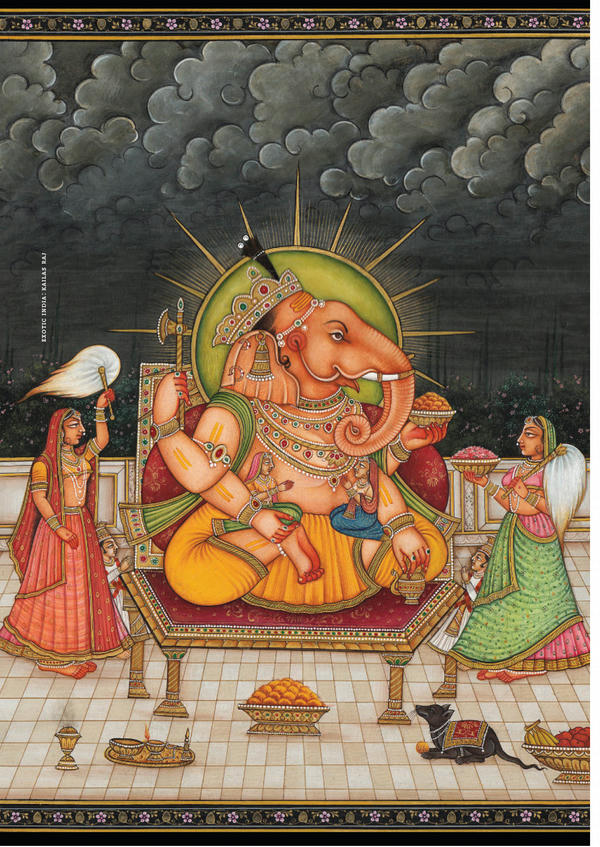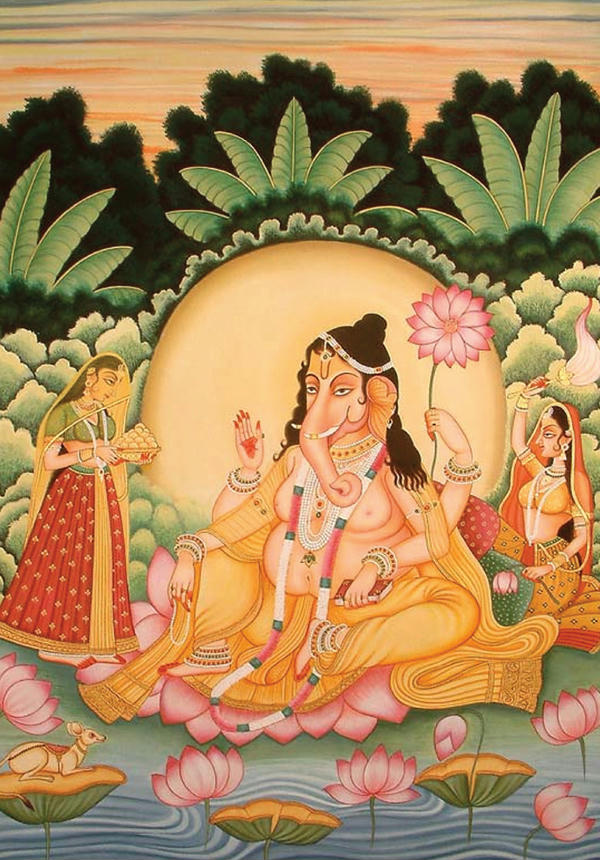Questions & Answers§
Praśna Uttarī cha§
प्रश्न उत्तरी च§
 OW IT MAY BE ENLIGHTENING IN OUR EXPLORATION OF THE WONderful being, Lord Gaṇeśa, to share with you answers to some of the questions most commonly asked about Him by the many inquirers worldwide. Hopefully these insights will inspire you to draw closer to Him and learn about His grace and His ever giving boons through your own experiences. Yes, Lord Gaṇapati is a mysterious God to most adults, but not to children. We, too, must be like little children to really enjoy and understand His majesty, mirth, wisdom and simple complexities. The God whose symbol is the swastika, who moves in many directions all at once, is truly, to a child, as simple as a digital on-and-off switch. Children who grow up in the ten arms of Him who has no second are quick and resilient of mind, amenable to change, not affected by wealth or poverty, adjustable and secure in His daily darśana before they worship other Lords of their choice.§
OW IT MAY BE ENLIGHTENING IN OUR EXPLORATION OF THE WONderful being, Lord Gaṇeśa, to share with you answers to some of the questions most commonly asked about Him by the many inquirers worldwide. Hopefully these insights will inspire you to draw closer to Him and learn about His grace and His ever giving boons through your own experiences. Yes, Lord Gaṇapati is a mysterious God to most adults, but not to children. We, too, must be like little children to really enjoy and understand His majesty, mirth, wisdom and simple complexities. The God whose symbol is the swastika, who moves in many directions all at once, is truly, to a child, as simple as a digital on-and-off switch. Children who grow up in the ten arms of Him who has no second are quick and resilient of mind, amenable to change, not affected by wealth or poverty, adjustable and secure in His daily darśana before they worship other Lords of their choice.§
Devotee: What is the nature of Lord Gaṇeśa?§
Gurudeva: Lord Gaṇeśa is a Mahādeva, a Great God, created by Lord Śiva to assist souls in their evolution. He is the elephant-faced Patron of Art and Science, the Lord of Obstacles and Guardian of Dharma, the first son of Śiva. His will prevails as the force of righteousness, the embodiment of Śiva’s karmic law in all three worlds.§
My satguru, Sage Yogaswami, proclaimed: “The God with the elephant’s face I shall never forget—Śaṅkara’s Son, with massive belly and the ring in His ear, the Lord who gave His grace to Indra, of whom mantra is His very form.” I often explain Lord Gaṇeśa in this way: “Lord Śiva, the Almighty Power, created heaven and earth and the God, Lord Gaṇeśa, to oversee the intricate karmas and dharmas within the heavens and all the earths. Lord Gaṇeśa was created as a governor and interplanetary, intergalactic Lord. His knowledge is infinite; His judgment is just. It is none other than Lord Gaṇeśa and His mighty band of gaṇas that gently help souls out of the Naraka abyss and adjust them into higher consciousness after due penance has been paid, guiding them on the right path toward dharmic destiny. He is intricate of mind, loving pomp, delighting in all things sweet and enjoying adulation. Lord Śiva decreed that this son be worshiped first, even before Himself. Verily, He is the Lord of Karma. All Mahādevas, minor Gods, devas and sentient beings must worship Lord Gaṇeśa before any responsible act could hope to be successful. Those who do not are subject to their own barriers. Yea, worship of Him sets the pattern of one’s destiny. Thus, this mighty ruler is truly a great God. The 2,200-year-old South Indian scripture Tirumantiram says, “Five-armed is He, elephant-faced, with tusks protruding, crescent-shaped, son of Śiva, wisdom’s flower; in heart enshrined, His feet I praise.”§
Devotee: What is Lord Gaṇeśa’s special role?§
Gurudeva: He is Vighneśvara, Lord of Obstacles. As such, He controls our evolution by preventing or permitting events to happen in our life.§
Lord Gaṇeśa holds the architect’s plans of the divine masterpiece of universal past and future of this small world and all the galaxies. They were entrusted to Him when He took office by command of God Śiva. His rule is compassionate, His disciplines strong. He is equally feared and loved. His law is just, for justice is His mind. He enjoys adulation, festivity, hearing of His name, for this brings the devotee into His court, into His presence, close to Him. Only good comes from Lord Gaṇeśa, who by taking the form of an elephant distinguishes Himself from other Gods. He staves off misfortune for those who perform penance in His name. He is within us and not otherwise, closer than our heartbeat, guiding our karma through the timing of events. Our Lord of Obstacles prevents us from hurting ourselves through living under an incomplete concept or making a request unneeded or beginning an endeavor not well thought out. He expects us to use all of our intellectual and intuitive faculties and resources, to employ the knowledge available to us before submitting petitions to Him. It is for us to try to arrive at the right decision, the one that He Himself would have made in granting the acquisition. Thus, this Mahādeva, wise and all-powerful, truly is a great God. The ancient Āgamas declare, “These Lords who, it is said, on the pure path, attend to the various duties deriving from a higher realm of māyā are at the prow of the effects of the higher realm of māyā.”§
Devotee: Why must we supplicate Lord Gaṇeśa before beginning
any worship or task?§
Gurudeva: At the command of God Śiva Himself, we supplicate, that is, humbly request, Lord Gaṇeśa to clear obstacles from the path of our endeavor, if it be His will. As Lord of Obstacles, Gaṇeśa wields the noose and the goad, icons of His benevolent power of preventing or permitting events to happen in our life. Thus, we invoke His grace and wisdom before any worship or task.§
My satguru, Sage Yogaswami, proclaimed: “May the Supreme Guru, who bestows on me His grace, be my protection! May the elephant-faced God be my protection! May the fair child who wields the shapely lance be my protection!” I have answered this question in this way: “The father and mother, in a properly conducted home, govern their children and prepare them to be fine citizens. The children ask permission from their parents before beginning any new endeavor. The employee asks permission from the employer before beginning any new endeavor. The subjects in a realm ask permission from the monarch before beginning any new endeavor. Why wonder we about asking permission from His Majesty, Lord Gaṇeśa, governor of this world, head, chieftain of our religion, before beginning any new endeavor? He of intricate mind and power is immediate and aware of any form of sincere prayer and supplication, humble requests to clear obstacles from the path of our endeavors, but only if that be His will. Thus, this loving God rules our lives, commanding acknowledgment and adulation—a truly great God is He.§
Devotee: What does it mean when an obstacle is encountered despite our sincere supplication of Lord Gaṇeśa?§
Gurudeva: It may mean that the time, the means or the goal itself is not right for our karma and dharma. The architect presents his finished plans to the engineer. They are rejected for one technical reason or another. The executive presents a completed letter to the president. It is rejected as not being explicit enough in the third paragraph. The architect and the executive were equally sincere in presenting their work. The engineer and the president were performing their duty as well. Lord Gaṇeśa loves us. He is a loving God who guides, governs and controls with speed and accuracy when the plan is perfect, deliberates long and rejects often when the plan needs revision. Take the plan back into your mind. Search your own superconsciousness for the greater ideas, and revise your efforts with confidence. Seek for the right timing, and proceed with confidence when you know the timing to be right. “When the will rises and commands, even the Gods are willing to obey,” or to give immediate cooperation, to guide and enhance our efforts. We must work our minds in close cooperation with the mind of Lord Gaṇeśa, and then success is certain. Thus, this God is called Bhaktavighnavināsana, He who destroys the obstacles of the devotees.§
If you worship the elephant-faced Vināyaka,
your life will expand bountifully.
If you worship the white-tusked Vināyaka,
your desires and doubts will flee.
Therefore, worship Him
with love offerings of jack, hoppers,
plantain and mango fruits
and thus mitigate the burden of deeds.§
Saint Auvaiyar§
O Elephant-Faced One!
You are so near and we are far from You.
You are in and we are out;
You are at home, while I’m a stranger.
Yet, You have destroyed my egoity.
I shall sing Your praise forever
and lay my garland of songs at Your feet.§
Saint Nambiandiyadigal§
He is worshiped with red flowers.
Unfailing, merciful, the origin of the worlds,
He appears at the beginning of creation,
alone, beyond Nature, beyond the Cosmic Person.
He who meditates on His form
becomes great among the yogīs.§
Gaṇapati Upanishad§
Gaja, the elephant, is the origin and the goal.
The stage reached by the yogī in his
experience of samādhi is called ga, the “goal,”
and the principle called ja, the “origin,”
is that from which the syllable
of obeisance, Aum, is said to be issued.§
Brahmā Sūtras§



